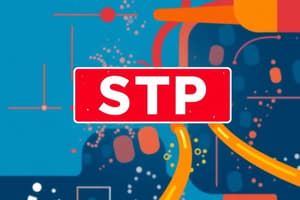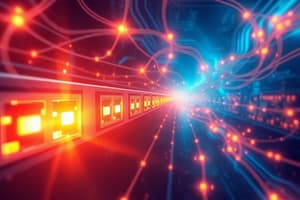Podcast
Questions and Answers
What is the primary function of a Layer 2 switch?
What is the primary function of a Layer 2 switch?
- To convert data between analog and digital formats
- To forward data frames based on MAC addresses (correct)
- To route data packets between different networks
- To provide IP address assignments to devices in a network
At which layer of the OSI model does a Layer 2 switch primarily operate?
At which layer of the OSI model does a Layer 2 switch primarily operate?
- Network Layer (Layer 3)
- Application Layer (Layer 7)
- Transport Layer (Layer 4)
- Data Link Layer (Layer 2) (correct)
How does a Layer 2 switch determine the appropriate port to forward a data frame?
How does a Layer 2 switch determine the appropriate port to forward a data frame?
- By analyzing the source IP address of the data frame
- By checking the type of data being transmitted
- By consulting the destination MAC address and its MAC address table (correct)
- By adhering to a predetermined forwarding protocol
What does the MAC address table in a Layer 2 switch do?
What does the MAC address table in a Layer 2 switch do?
In what scenario does a Layer 2 switch add a new MAC address to its table?
In what scenario does a Layer 2 switch add a new MAC address to its table?
What distinguishes Layer 3 switches from Layer 2 switches?
What distinguishes Layer 3 switches from Layer 2 switches?
Which of the following would NOT be a direct benefit of using a switch in a LAN?
Which of the following would NOT be a direct benefit of using a switch in a LAN?
Which layer of the OSI model is responsible for end-to-end communication and error recovery, distinct from the functions of a Layer 2 switch?
Which layer of the OSI model is responsible for end-to-end communication and error recovery, distinct from the functions of a Layer 2 switch?
What occurs when a Layer 2 switch receives a frame with an unknown destination MAC address?
What occurs when a Layer 2 switch receives a frame with an unknown destination MAC address?
Which of the following statements accurately describes the role of a Layer 2 switch in managing collision domains?
Which of the following statements accurately describes the role of a Layer 2 switch in managing collision domains?
What is one of the primary functions of VLANs within a Layer 2 switch environment?
What is one of the primary functions of VLANs within a Layer 2 switch environment?
Why do Layer 2 switches not perform IP routing between networks?
Why do Layer 2 switches not perform IP routing between networks?
How does the Spanning Tree Protocol (STP) function in Layer 2 switching environments?
How does the Spanning Tree Protocol (STP) function in Layer 2 switching environments?
What happens by default to broadcast frames generated in a Layer 2 switch?
What happens by default to broadcast frames generated in a Layer 2 switch?
Which of the following best describes the broadcast domain of a Layer 2 switch?
Which of the following best describes the broadcast domain of a Layer 2 switch?
What is a crucial characteristic of Layer 2 switches compared to Layer 3 switches?
What is a crucial characteristic of Layer 2 switches compared to Layer 3 switches?
Study Notes
Introduction to Switching
- Discussion of switch operation, Layer 2 and Layer 3 switching, and basic switch configuration.
- Lead-in to VLAN concepts, highlighting the shift from general switching to more specific network segmentation techniques.
What is a Switch?
- A networking device that connects multiple devices (computers, printers, servers) within a local area network (LAN).
- Primarily functions at the Data Link Layer (Layer 2) but some models can operate at the Network Layer (Layer 3) for routing.
OSI Model
- A conceptual framework consisting of seven distinct layers used to understand and implement network protocols.
- Each layer has a specific function and interacts with adjacent layers, ensuring interoperability among different network devices.
Layer 2 Switch
- Operates at the Data Link Layer (Layer 2) of the OSI model, primarily forwarding data frames within the local network based on MAC addresses.
Key Characteristics of Layer 2 Switches
-
MAC Address-Based Forwarding:
- Forwards frames based on destination MAC address; checks its MAC address table (CAM table) for port associations.
-
MAC Address Table:
- Dynamically maintained table mapping MAC addresses to switch ports, allowing the switch to learn and store active devices.
-
Frame Filtering and Forwarding:
- Unicast: forwards frames only to the port associated with known destination MAC addresses.
- Unknown MAC addresses lead to flooding frames to all ports except the source.
- Broadcast/multicast frames sent to all ports except the source port.
-
No Routing Capabilities:
- Does not route IP packets between different networks; all devices connected must be within the same broadcast domain.
-
Collision Domains:
- Each port is a separate collision domain, reducing collisions by providing dedicated bandwidth to connected devices.
-
Broadcast Domain:
- All ports on a Layer 2 switch are in the same broadcast domain, sending broadcast frames (like ARP requests) to all ports.
-
VLAN Support:
- Supports Virtual Local Area Networks (VLANs) to segment a physical network into multiple logical networks, enhancing security and performance.
-
Spanning Tree Protocol (STP):
- Prevents network loops in redundant path environments by ensuring only one active path exists between devices while blocking others.
Summary of Layer 2 Switch Functionality
- Fundamental device for managing data traffic within a LAN, relying on MAC addresses for forwarding.
- Provides connectivity, minimizes collisions, supports VLANs, but lacks routing capabilities found in Layer 3 switches or routers.
Studying That Suits You
Use AI to generate personalized quizzes and flashcards to suit your learning preferences.
Related Documents
Description
This quiz explores the fundamental concepts of switching and the basic configuration techniques for switches. It covers the operations of switches, including layer 2 and layer 3 switching, and introduces configurations that lead into VLAN discussions. Perfect for students looking to solidify their understanding of networking fundamentals.




